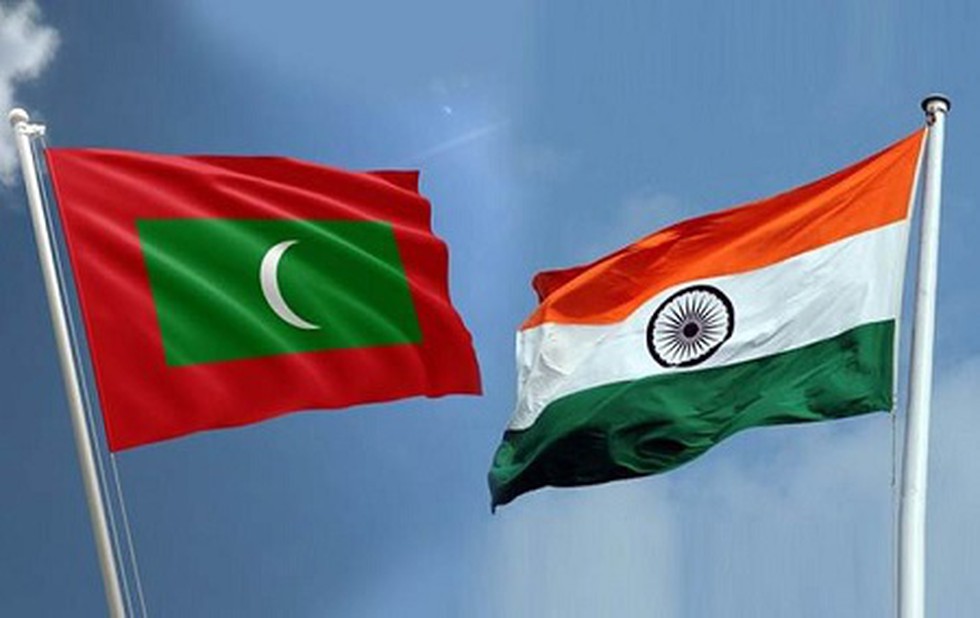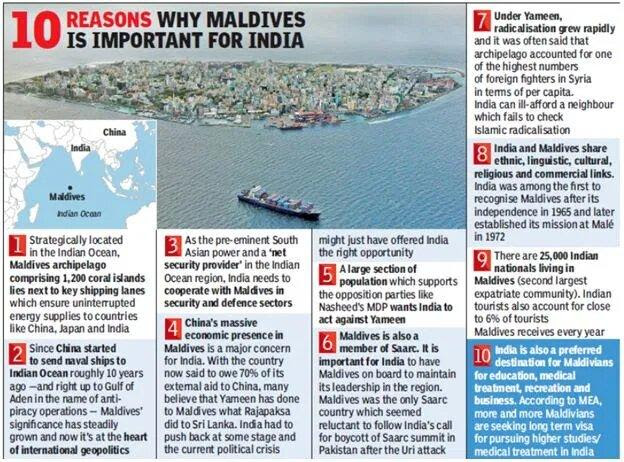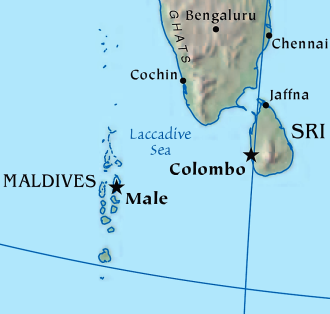Description

Copyright infringement is not intended
Context: Earlier this month, the Maldives Supreme Court overturned the money laundering conviction against former president Abdulla Yameen Abdul Gayyoom.
Background:
- In November 2019, Yameen was sentenced to five years in prison for money laundering, where the charges focused on a payment of $1m by a private company that was meant for the government.
- Yameen’s newfound freedom has implications not just for the upcoming presidential and parliamentary elections in the Maldives in 2024, but also for wider Maldives-India relations.
- The former president had served as president for five years before his surprising defeat in the 2018 elections with Ibrahim Solih becoming the country’s new leader.
- During his tenure, the hardliner Yameen’s open preference for Saudi Arabia and China and his hostility towards India became a part of the wider geopolitical battle between New Delhi and Beijing.
- Yameen’s previous tenure has been heavily criticised for its infringements of human rights, the suppression of dissent, controlling freedom of speech and expression and other violations that the Human Rights
Other recent developments
- Maldives government officially inked a deal with Mumbai-based company AFCONS, for the construction of the Greater Malé Connectivity Project (GMCP).
- It is a $500-million infrastructure project, which is the largest-ever by India in the Maldives.
- India has been making significant investments in various development projects in the archipelagic state.

India-Maldives bilateral Relations:
India and Maldives are neighbors as they share a maritime border. Relations have been friendly and close in strategic, economic and military cooperation. India continues to contribute to maintaining security on the island nation.
Historical relations:
- Both nations’ were Britain colonies.
- India was among the first to recognise Maldives after its independence in 1965 and to establish diplomatic relations with the country. India established its mission at Malé in 1972.
- India and Maldives share ethnic, linguistic, cultural, religious and commercial links steeped in antiquity and enjoy cordial and multi-dimensional relations.
Political relations:
- India and Maldives have consistently supported each other in multilateral fora such as the UN, the Commonwealth, the NAM and the SAARC.
- High connectivity: High People-to-People contacts, as Air India operates daily flights to Malé from Thiruvananthapuram, Bangalore and Chennai.
- Tourism: The proximity of location and improvements in air connectivity in recent years has led to a very substantial increase in the number of Indians visiting Maldives for tourism (around 33,000) and business.
- Soft diplomacy: India is a preferred destination for Maldivian for education, medical treatment, recreation and business.
- Diaspora: Indians are the second largest expatriate community in the Maldives.

Why Maldives matters to India?
Strategic location:
- Maldives holds strategic importance for India under the Modi government’s ‘Neighborhood First’ policy due to its location in the Indian Ocean.
- The Eight Degree Channel is one of the major maritime lanes of the world.
- Stability, maturity and democratic systems in the Maldives can ensure peace and security in the Indian Ocean.

Major challenges:
Chinese influence:
- India has been quite apprehensive of the growing Chinese influence in Maldives even as it continues to give utmost priority to the island nation.
- There have been growing concerns regarding China’s role in the Maldivian economy through so-called “debt-trap diplomacy.”
- Maldives incurred a debt of about $1.4 billion owing to loans from China to finance several of its infrastructure projects.
- Maldives and China had also entered into a free trade agreement.
India’s position in Male crisis:
- During the pro-Beijing regime of their former President Abdulla Yameen, ties between the nations got strained. In fact, there came a point in 2018 when India even contemplated a military intervention.
Measures taken so far:
- After coming to power for the second time in May last year, Prime Minister Modi’s first international destination was Maldives. He was also the only head of state to attend Maldives President Ibrahim Mohamed Solih’s swearing-in ceremony in November 2018, when he came to power ousting Yameen.
- India has also offered a $1.4-billion development assistance package to Maldives, which is being utilised in several projects.
- 30 years ago, in 1988, an intervention by the Indian armed forces - codenamed 'Operation Cactus' - trounced an attempted coup on the island nation. On November 3, 1988, when mercenaries attacked the Maldives, India was the first to respond.
- In 2004, when the tsunami hit Maldives, Indian naval ships were dispatched to assist rescue operation.
- During the Male water crisis. Within four hours Indian Navy and Air Force vessels delivered water.
Way forward:
- Past learning’s: Despite repeated calls for intervention, India firmly avoided military action against the Yameen regime. New Delhi thoughtfully coordinated its diplomatic response with other stakeholders, and put enormous pressure on Yameen to hold the presidential elections in a fair and transparent manner. This patience seems to have yielded a positive outcome as India finds itself in an advantageous situation now.
- Cautious approach: India needs to remain careful if it wants to avoid a Nepal-like situation, where New Delhi’s perceived interference in Nepal’s internal affairs had turned the Nepali people against India. Having a lighter diplomatic footprint is the only way forward in the Maldives.’
https://indianexpress.com/article/explained/explained-abdulla-yameen-acquittal-india-maldives-relations-7676212/
















